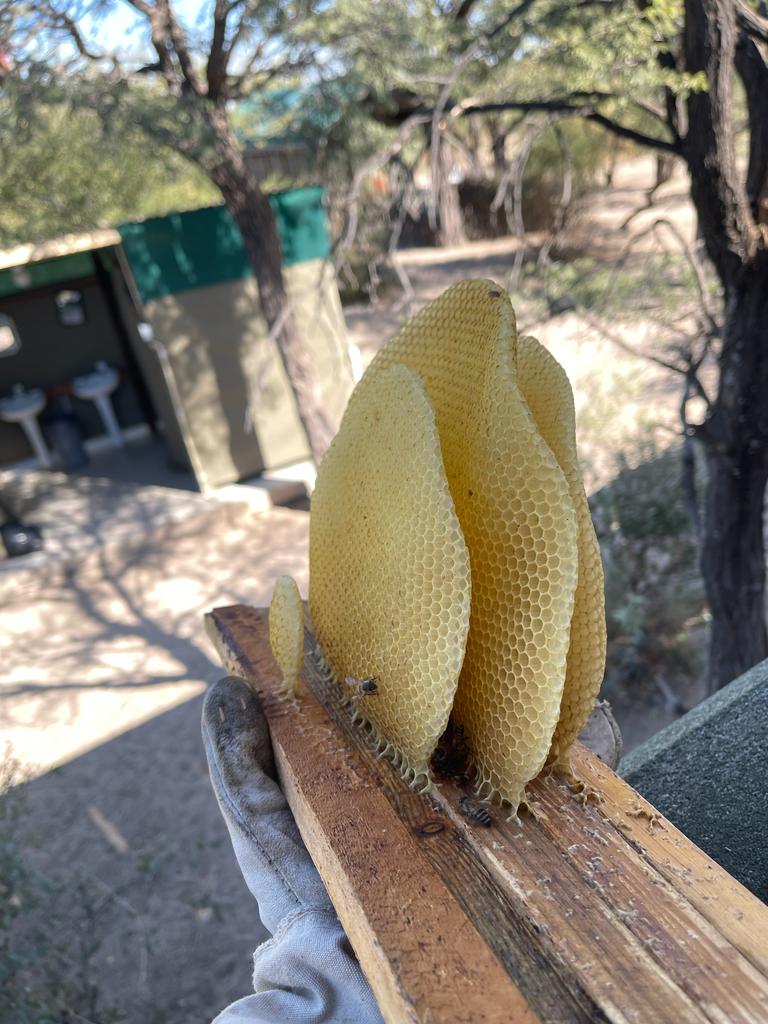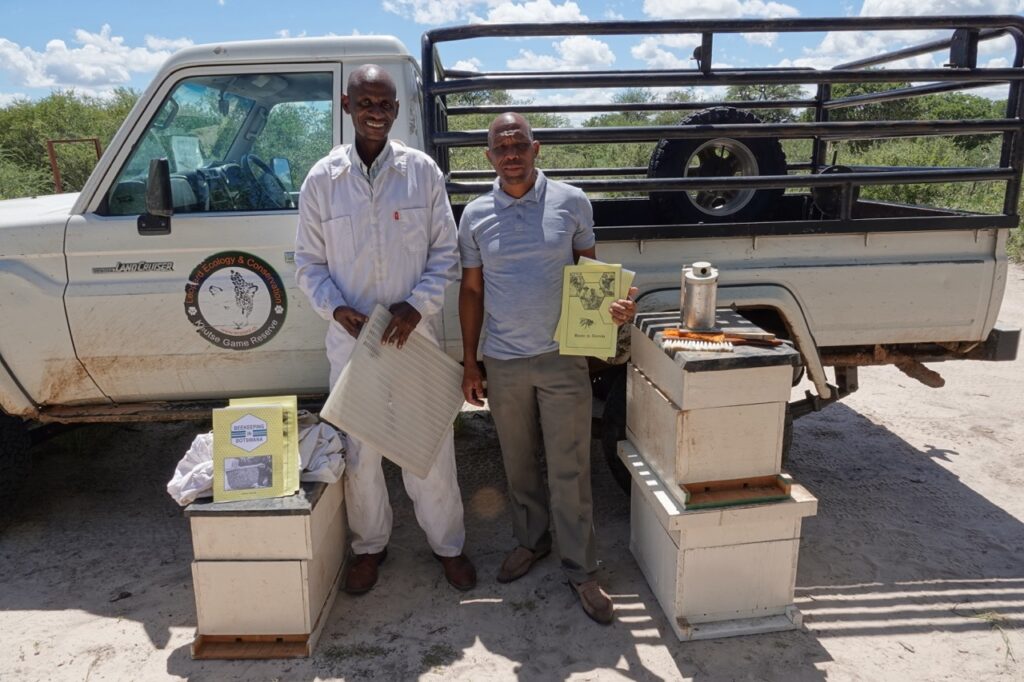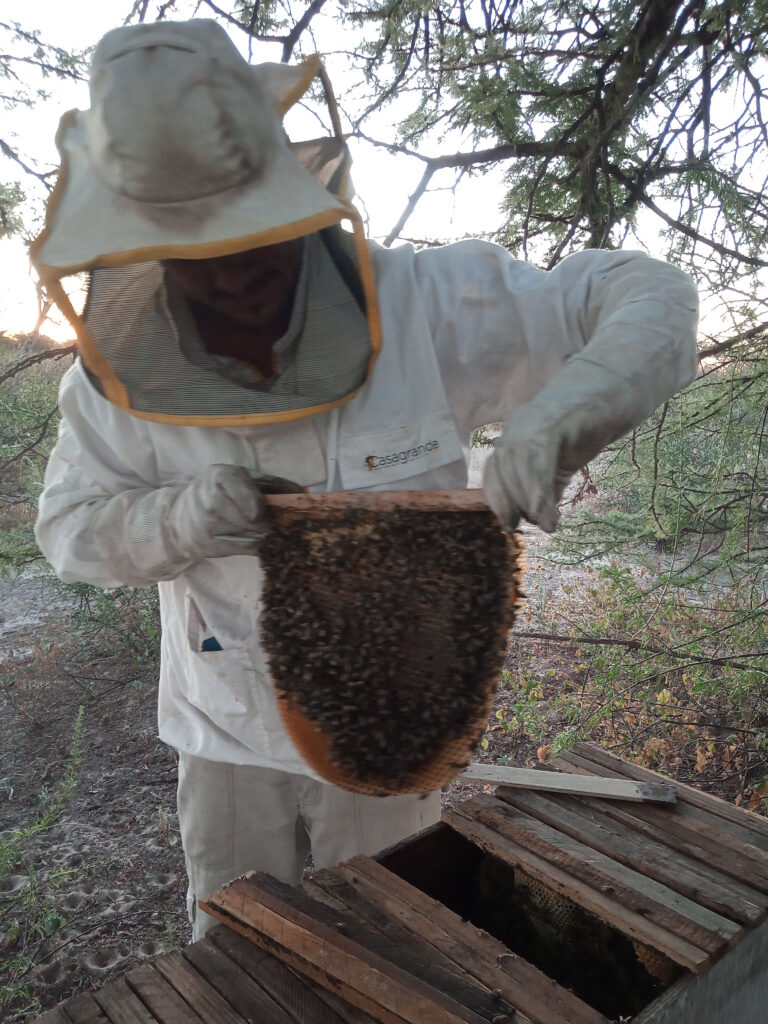In the heart of Botswana’s Kalahari, Leopard Ecology & Conservation (LEC) is working with the Kaudwane community to turn bees into agents of change. In a region where unemployment is high and overgrazing threatens the land, beekeeping is emerging as a powerful tool for both livelihoods and the environment. What began as a small initiative has now grown into “Gene Xlhauu”, the area’s first community-based beekeeping group, officially registered in October 2023 and made up of local women and men. With training, tools, and new hives, this grassroots project is creating new opportunities while restoring biodiversity.
A Community-Led Solution
Kaudwane is a village of about 1,200 people living on the edge of the Central Kalahari and Khutse Game Reserves. Like many rural communities in Botswana, it faces high unemployment and depends heavily on livestock farming, which has led to overgrazing and degradation of natural vegetation. For years, families survived by harvesting honey from wild hives, often destroying nests in the process. Beekeeping as a managed activity was rare. That is beginning to change. With LEC’s support, Gene Xlhauu started managing two apiaries, shifting away from unsustainable honey hunting toward modern, sustainable beekeeping. The group, currently four women and two men, represents a powerful step forward, not just economically, but socially, as women and youth are gaining skills and recognition as environmental stewards.
Why Bees?
The benefits of beekeeping reach far beyond honey. Bees are critical pollinators, supporting both wild plants and crops. In the semi-arid savanna around Kaudwane, bees help maintain plant diversity, which in turn stabilizes soils, provides grazing for livestock, and strengthens the entire ecosystem. This is especially important in buffer zones between villages and wildlife reserves, where human activities and conservation needs intersect. Beekeeping also offers families a way to diversify incomes. At present, Botswana produces only 1.5% of the honey it consumes, meaning local honey is in high demand. With the right training and equipment, Kaudwane beekeepers can produce honey and beeswax not just for household use but also for sale in local and regional markets.


Training and Capacity Building
One of the key goals of the project is to build lasting skills. Members of Gene Xlhauu receive regular training sessions from experienced beekeeping consultants and the regional Letlhakeng Beekeeping Office. These workshops cover everything from hive management and honey extraction to pollinator health and marketing strategies. Three major training sessions are planned between 2024 and 2025, ensuring that both beginners and experienced members continue to strengthen their skills. Beyond skills, the project invests in resources. A new apiary with five additional hives was launched in 2024, with local members responsible for managing the colonies. This expansion not only boosts honey output but also deepens community ownership of the initiative.
Linking Bees and Biodiversity
The project goes beyond honey production. A core component is monitoring native plants, studying which species provide the best nectar and pollen sources for honeybees. Every 15 days, trained community members collect samples from the vegetation surrounding the apiaries. This work will produce the region’s first pollen library, in partnership with the University of Agriculture and Natural Resources of Botswana. The library will not only help improve beekeeping practices but also add value to “Kalahari honey” by documenting its floral origins. By linking pollination to vegetation monitoring, the project directly addresses the problem of overgrazing. It provides knowledge for future restoration plans and highlights the ecological importance of protecting flowering plants and habitats.
Inspiring the Next Generation
For change to last, it must include the next generation. That’s why LEC and Gene Xlhauu are engaging schools and young people. In 2025, the group will hold an environmental education event at the Kaudwane school, teaching children about bee ecology, conservation, and sustainable beekeeping. Another open event at the village Kotla (traditional meeting place) will bring the entire community together to share knowledge and celebrate the role of bees.
By involving children and youth, the project nurtures future beekeepers and conservationists while ensuring that traditional and scientific knowledge are passed down together.
Building a Sustainable Future
The beekeeping initiative is designed with long-term sustainability in mind. Success is measured not only in honey production but also in community engagement, hive survival, and ecosystem restoration. Goals include increasing honey yields by at least 10 kilograms per hive by 2026, maintaining survival of more than 60% of hives, and engaging at least 20 participants in each school and community event. Risks, such as drought, hive loss, or low production are acknowledged, but the project has strategies to adapt, including supplementary feeding for bees and diversification of products. Partnerships with regional institutions, government departments, and international foundations provide technical and financial support, ensuring that the initiative can grow even after initial funding ends.
More Than Honey
At its heart, this project is about more than producing honey. It is about empowerment, helping women, men, and youth build skills, earn incomes, and take pride in conserving their land. It is about resilience; offering communities a livelihood that works with nature instead of against it. And it is about connection; linking people, pollinators, and ecosystems in a way that benefits all three. From two small apiaries in Kaudwane, a model is emerging for how rural communities across Botswana can use beekeeping to create hope, opportunity, and environmental renewal.

